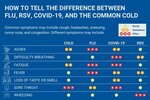

As the winter season progresses, we are hearing more coughs and sneezes. Some of us are coming down with respiratory illnesses such as the flu, COVID-19, or respiratory syncytial virus (RSV). These respiratory illnesses are caused by viruses (germs), most of the time leading to cold-like symptoms, but they can also be more serious, causing difficulty breathing or even pneumonia. So, how do we protect ourselves and our families this season?
The power to protect ourselves and our families is in our hands.
Eating nutritious, well-balanced meals with vegetables and fresh fruits every day and exercising daily helps to keep our immune systems working well to fight germs.
You can choose some everyday preventive actions to stop germs from spreading:
And finally, we want to stay up to date on our vaccines to protect ourselves from serious complications of diseases such as the flu or COVID-19.
Unfortunately, it is not. If you’ve had the flu, you know that it can keep you down for several days. You may miss work/school or family events. You may also spread the flu to others who are more vulnerable to severe complications from the flu, such as older family members or babies/young children.
If you have chronic medical conditions such as asthma, diabetes, heart, lung, or kidney disease, you are more likely to end up in the hospital if you end up with the flu. The flu can cause your asthma or diabetes to flare up or worsen, even if it was stable before. The flu can also be deadly.
Bottom line: No medicine, no vaccine is 100% effective. Getting a flu vaccine may not prevent you from getting the flu altogether, but it surely decreases your chance of getting seriously ill or dying from the flu because you are vaccinated. If you think of driving a car, getting vaccinated is like wearing your seatbelt. The seatbelt may not stop an accident, but it can decrease your chances of getting seriously injured.
Did you know that the risk of having a heart attack or stroke is significantly increased if you have the flu? A 2018 study found that the risk of having a heart attack was six times higher within a week of having had a flu infection, particularly among older adults and people who were experiencing their first-ever heart attack. www.cdc.gov/flu/highrisk/heartdisease.htm.
Unfortunately, no! Just because the pandemic has been designated as over, it does not mean that the COVID-19 virus is gone. The COVID-19 virus is still causing illnesses, hospitalizations and, unfortunately, deaths every week in the U.S., https://covid.cdc.gov/covid-data-tracker/#datatracker-home, and around the world, https://covid19.who.int/.
Some people who have had a COVID-19 infection, even those who had a mild case, have developed long-term complications. Some of the complications include persistent brain fog, anxiety, depression, and heart and lung complications in both adults and children. These symptoms can last for weeks to months. This is sometimes called Long COVID.
Just as with the flu, when older adults, people who are immunocompromised, and people with certain disabilities or underlying health conditions get infected with the COVID-19 virus, they are more likely to get very sick and suffer complications.
I already got sick with COVID-19 several times. What is the point of getting another COVID-19 vaccine?
Even if you have been infected with the COVID-19 virus before, it’s important to stay up to date on your COVID-19 vaccine. Your immunity (protection) from a prior COVID-19 infection wears off over time. It is not permanent protection.
So, if you have not already done so, get your updated COVID vaccine to:
Talk to a healthcare provider today about the best time to get your updated COVID-19 vaccine dose.
I have had several doses of the COVID-19 vaccine already. Why do I need more? Protection from COVID-19 vaccines wears off after several months. Even if you have had multiple doses of the COVID-19 vaccine in the past, you are not up to date if you have not received the newer, updated COVID-19 vaccine. It’s important to stay up-to-date on your vaccines to stay protected.
If you have a severely weakened immune system (such as in people who recently had or are undergoing treatment for cancer or organ transplants), you may need multiple doses of the COVID-19 vaccine over time in order to stay protected. Getting infected with COVID-19 when you have a weakened immune system could lead to hospitalization or even death.
You may have heard about the virus called RSV (respiratory syncytial virus). It has been around for a long time. We normally hear about it affecting children and babies. For most people, it causes mild cold symptoms for a few days, but in some babies and younger children, it can cause them to wheeze or end up in the hospital needing oxygen. But do you know that RSV can lead to breathing difficulties, pneumonia, hospitalization, and other complications in older adults as well? If you are 60 years or older, ask your healthcare provider today about RSV and whether the RSV vaccine is suitable for you.
The only sure way to know that you may be sick with flu, COVID-19, or RSV is to get tested. Getting tested is especially important if your symptoms are getting worse. Stock up on free COVID tests that you can take at home by going to www.COVID.gov. You can fill out a form and have tests sent directly to your home. You can find in-person locations to get tested for COVID-19 at testinglocator.cdc.gov.
For more details, visit https://www.cdc.gov/respiratory-viruses/index.html.
Comments
No comments on this item Please log in to comment by clicking here